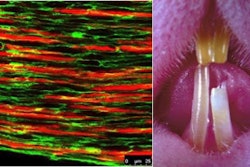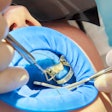The National Institute of Dental and Craniofacial Research has awarded a three-year, $1.8 million in funding to George Huang, DDS, director of bioscience research at the University of Tennessee Health Science Center, extending a grant originally received in 2008 to study a stem cell root canal treatment.
Traditionally, a root canal involves removing decayed dental pulp from the tooth's canal and filling that space with an artificial, rubber-like substance. If Dr. Huang's research is successful, the canals that have been cleared would be injected with stem cell tissue. Not only would this technique avoid the need for the rubber-like filling, it could actually stimulate healthy tissue growth, essentially rebuilding the tooth.
Dr. Huang estimated the cells might regenerate within a two-month period.
The concept of trying to regenerate growth of a tooth by inserting stem cell tissue has been around since the '60s, but little progress has been made. Dr. Huang attributes the standstill to the lack of technology available at that time. Research on tissue engineering, as this type of science is known, has progressed considerably with the advancement of technology, including robotics.
Thus far, research similar to Dr. Huang's in other countries has been successful. A veteran endodontist, Dr. Huang said perfecting this method would offer patients a choice. His research also examines harvesting the stem cells from a person other than the patient. Clinical trials on humans could begin in the next 10 years.
Four years ago, Dr. Huang began a study to determine the feasibility of taking tissue from a healthy tooth and placing it in a diseased root canal. Successful results could change how root canals are performed.
He began the research at Boston University but joined the UTHSC in May 2012.



















